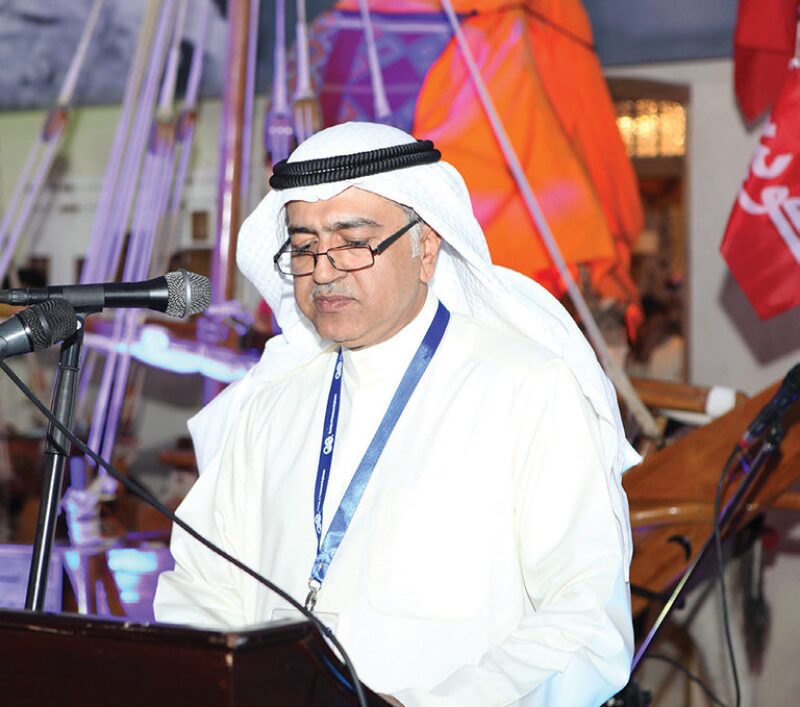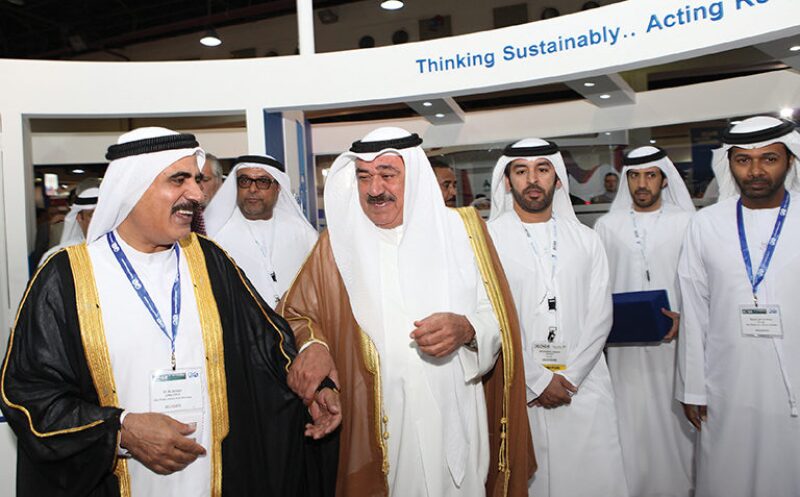The inaugural SPE Kuwait Oil and Gas Show and Conference (KOGS), held 7–10 October 2013 in Kuwait, attracted more than 3,000 delegates representing major oil and gas companies from all over the world.
The event, under the patronage of Kuwait’s Prime Minister Sheikh Jaber Mubarak Al-Hamad Al-Sabah, carried the theme “The Power of Collaboration…People and Technology in the Oil and Gas Industry,” Hosnia Hashim, KOGS conference program chairperson and vice president of operations at Kuwait Foreign Petroleum Exploration Company (KUFPEC), said that the gathering allowed exploration and production professionals to network with colleagues from around the world and celebrate key successes in the industry. “For the first time ever in Kuwait,” she said, “we launched a technical event with outstanding participation, having received more than 520 papers, from 104 organizations and 69 universities, from 37 countries.”
In his opening remarks at the Conference Opening Ceremony, Kuwait Deputy Premier and Minister of Oil Mustafa Al-Shimali, reiterated Kuwait’s unflinching commitment, in its capacity as a main oil producer, to ensuring regular supplies to world markets. “This conference is timely and logical, as the Kuwait oil sector is undertaking plans to ensure that it meets and fulfills its international role as a reliable supplier. We have allocated billions of US dollars to reach production capacity of 4 million BOPD by 2020. An international exchange of technology and experience is critical to realizing these plans,” Al-Shamali said.

At the Executive Plenary Session, Nizar Al-Adsani, chief executive officer of Kuwait Petroleum Corporation (KPC), aentation titled “Kuwait Experience: The Power of Collaboration, People, and Technology in the Oil and Gas Industry,” that the challenges ahead for his country are great. “The emergence for new competitors, changes in supply and demand dynamics, social and environmental pressures, and demographic shifts, are transforming and reshaping our industry,” he said.
Al-Adsani said that technology has been the driving force behind the industry’s continued ability to deliver increased oil and gas production safely, efficiently, and in an environmentally friendly manner, adding that he believes that the excellence required is only provided through the strength of human resources.
The CEO said that his company is proceeding with its ambitious plans to enhance KPC’s role in the international oil industry and to be more effective in supply security for the world’s energy, adding that KPC wants to focus on the upstream. “Achieving our crude oil production growth target of nearly 1 million BOPD by 2020, and maintaining it through 2030, depends on the successful implementation of advanced technology in both improved and enhanced oil recovery,” he said.
Kuwait aims to spend USD 100 billion over the next 5 years on development projects, with 60% spent on upstream project expansion inside and outside of Kuwait. “This is in addition to escalating operating costs as our fields mature. These great challenges can’t be met and overcome by ourselves,” Al-Adsani noted. “It is our strategy to invest to maintain excess capacity, which has proved so far to be a correct strategy.”
Moreover, the additional production capacity will come from geologically complex reservoirs, which require highly skilled people. “The skills required to develop such complex and difficult reservoirs and achieve such a production capacity are not sufficient in terms of skills, or expertise, or know-how. We definitely need the assistance of the different IOCs to work with us, in an acceptable form of win-to-win basis, to achieve all of these strategic targets,” Al-Adsani added.
Speaking about relationships with IOCs, the CEO of KPC said that these partnerships should fulfill overall Kuwait strategic interests and concerns. “In these relationships, we focus on several issues such as the transfer of technology, promoting the skills of our nationals in various disciplines, bringing in management processes, and leveraging with them for maximum benefit. We are fully aware of the need to partner with IOCs but also we are very careful about ensuring an effective future role of IOCs in the Kuwait oil industry that will eventually add value in our understanding and perception,” he said.
Despite the collapse of the USD 17 billion joint venture between Kuwait’s Petrochemical Industries Company (PIC) and the US Dow Chemical, where Dow subsequently sued PIC and was awarded more than USD 2 billion in damages by an international court in 2012, Kuwait will continue to explore and develop partnerships with international oil companies on many industry fronts.
Al-Adsani said that the key for making the industry more efficient is, without doubt, technological advancement. “Technology is vital across the energy landscape and in the field of clean energy production in order to serve and preserve the environment. The oil industry has a long history of innovation to generate new sources of supply,” he said. “There is no country in the world that can insulate itself from changes in the oil market, whether positive or negative.”
Hashem Hashem, CEO of Kuwait Oil Company (KOC) and chairperson of the KOGS Executive Committee, stated that his company is contributing to the country’s socioeconomic development and looks forward to the future through increasing oil output, meeting company development requisites while helping maintain the stability of world markets.
Khaled Al-Buraik, vice president for petroleum engineering and development at Saudi Aramco, said in his Plenary Session presentation that technology, people, and collaboration work together in the quest for business excellence. Technology is the cornerstone of what oil and gas companies do, and major players including Saudi Aramco are transforming into technology developers. “Our goals are for breakthrough, disruptive technologies,” Al-Buraik said.
As such, the goals are very long term and carefully calibrated to objectives. This research stresses fundamental science. It also calls for synergy among the sciences and other disciplines of Saudi Aramco’s business. “We are breaking down organizational barriers in pursuit of technology breakthroughs.”
Cyber Security Thoughts
John Fridye, cyber security engineer at Ventyx, an ABB Company, says multi-layer systems are the best solution to counter cyber attacks.
As a cyber security engineer, what are your main duties within Ventyx?
Ventyx offers enterprise software solutions for energy, mining, and other industries. Within Ventyx, I am focused on network control products, which include energy management and SCADA control systems. We have a broad focus on network control because it is critical for companies we deal with.
Outside of network control, ABB and Ventyx have a wider cyber security presence, where ABB has a cyber security council made up of members of different product lines. Ventyx is in charge of the power systems group, but there are people from all different groups like robotics, automation, and many other groups.
As an engineer specializing in cyber security, what are the challenges facing developers of cyber security solutions or technology?
The challenge is to define a process, which means defining your design methodology, which we call a threat-modeling analysis. It aims mainly at looking for what could be avenues of attack at your product line. After that, the threat model analysis looks at what security controls you design that block those avenues of attack, and then you go through the test phase to ensure that these security controls are indeed effective against particular threats to your products, and then you can implement the product and deliver it to customers, it is an ongoing process.
Are there any specific security control systems that help you build the cyber security system?
There are many types of security control and many of them are well defined; in addition, there are many defense mechanisms that can be used and one of them is called defense in depth. If you penetrate one security control there is another one behind it, and we call that the onion model, because you have to pile through the layers to get down to the core you want to attack. So, if you have that defense in depth, that is a key defense of your critical systems.
Development of people is also crucial for oil and gas companies, particularly a commitment to lifelong learning, he said. Al-Buraik said that Saudi Aramco has a large program to cultivate science and engineering skills among high school students in Saudi Arabia. The company recruits directly from high schools, including apprentices for vocational careers and students whom it sponsors for university education and professional employment. “We send our professionals on to master’s and doctoral programs,” he said. “In-house programs such as the new Upstream Professional Development Center are game-changers for on-boarding much-needed talent. All told, the company’s training and development budget is among the largest in the world.”
Collaboration is also key to the prosperity of the industry, not only internally among disciplines, but also externally with other institutions. “We operate numerous other joint ventures in the kingdom and abroad. Adjacent to our headquarters and King Fahd University of Petroleum and Minerals is the extra-ordinary new Dhahran Techno–Valley, a science park with a collaborative atmosphere housing research centers of GE, Honeywell, Baker Hughes, and many more,” Al-Buraik said.
Companywide, Saudi Aramco plans to increase research spending fivefold. It will also triple its manpower in science and technology. “Most—about 80%—of this growth will be in Dhahran, but we also are opening upstream and downstream satellite research centers around the globe in partnership with the automotive industry and leading academic institutions.”
Patrick Pouyanne, president of refining and chemicals at Total, said the relationship between national oil companies and international oil companies is that they share a common objective, which is bringing energy to people. “In this type of collaboration, IOCs propose technology, project management, and financing, as well as acceptability to the market,” he said. “As an IOC, we always aim to bring value to host countries for win-win partnerships.”
As an IOC, Total works on answering host countries’ expectations in terms of transferring know-how, accompanying NOCs in their ambitions beyond their boundaries.
Delegates attending the KOGS event agreed that collaboration is key to the industry’s success amid the growing challenges facing the oil and gas sector. Overall, the event offered the opportunity to network with industry peers, and also to learn more about oil and gas investment opportunities in Kuwait.

